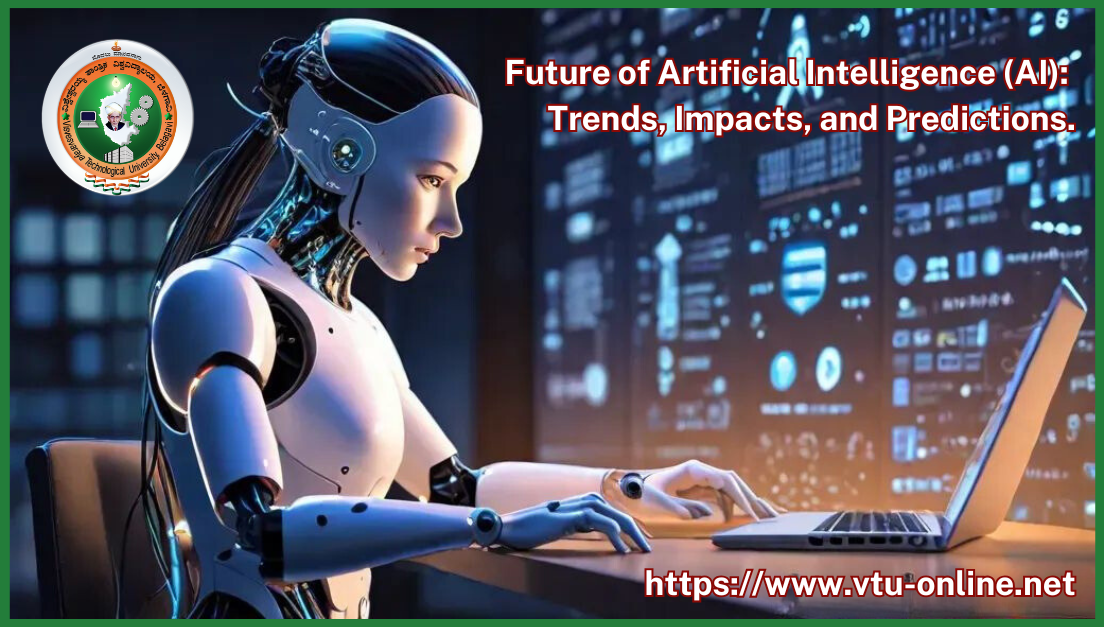
Future of Artificial Intelligence (AI): Trends, Impacts, and Predictions
Artificial intelligence (AI) has rapidly evolved from a concept in science fiction to a transformative force reshaping industries and daily life. As we peer into the future, the trajectory of AI becomes increasingly fascinating, promising both immense benefits and potential challenges. This exploration delves into the key trends, impacts, and predictions that will define the future of AI.
1. Advancements in Artificial Intelligence Models and Algorithms:
- Generative AI: Models like GPT-4 and Stable Diffusion are pushing the boundaries of creativity, enabling AI to generate realistic text, images, and even code. This has far-reaching implications for content creation, design, and problem-solving.
- Foundation Models: These large-scale models, trained on massive datasets, are becoming the backbone of AI applications. They can be adapted to various tasks with minimal additional training, making AI more accessible and efficient.
- Reinforcement Learning: This technique, where AI agents learn through trial and error, is advancing rapidly. It has the potential to revolutionize areas like robotics, autonomous vehicles, and game AI.
2. AI and the Internet of Things (IoT):
- The convergence of AI and IoT is giving rise to intelligent devices and systems that can collect, analyze, and act on data from the physical world. This has applications in smart homes, cities, and industries, leading to increased efficiency and sustainability.
3. Ethical AI and Responsible Development:
- As AI becomes more powerful, ethical considerations are paramount. There is a growing emphasis on developing AI systems that are fair, unbiased, and transparent. This includes addressing issues like algorithmic bias, privacy concerns, and the potential for job displacement.
4. AI in Healthcare:
- AI is transforming healthcare by enabling earlier disease detection, personalized treatment plans, and drug discovery. AI-powered medical imaging, genomics analysis, and robotic surgery are just a few examples of its impact on the healthcare industry.
5. Artificial Intelligence in Education:
- AI-powered personalized learning platforms are tailoring education to individual student needs. AI can also automate administrative tasks, freeing up educators to focus on teaching and mentoring.
Impacts of AI on Society
- Economic Transformation: AI has the potential to create new industries and jobs while disrupting existing ones. Automation and increased productivity will reshape the workforce, requiring upskilling and reskilling initiatives.
- Enhanced Productivity and Innovation: AI can streamline processes, automate tasks, and accelerate innovation. This can lead to increased efficiency, cost savings, and the development of groundbreaking technologies.
- Ethical Challenges: As AI becomes more integrated into society, ethical considerations like bias, transparency, and accountability become critical. Ensuring that AI is used responsibly and ethically is essential to mitigate potential negative consequences.
Predictions for the Future of AI
- AI-Powered Personal Assistants: AI will become even more integrated into our daily lives, powering personal assistants that can anticipate our needs, schedule our days, and provide personalized recommendations.
- Advancements in AI-Driven Creativity: AI will collaborate with humans to create art, music, and literature, pushing the boundaries of human creativity.
- AI for Social Good: AI will be used to address global challenges like climate change, poverty, and disease. It will enable us to make more informed decisions and develop innovative solutions.
- Increased Regulation and Governance: As AI's impact grows, governments and international organizations will need to develop frameworks to regulate its development and use.
- A Symbiotic Relationship Between Humans and AI: The future of AI is not about replacing humans but about augmenting our capabilities. Humans and AI will work together to solve complex problems and achieve new heights.















